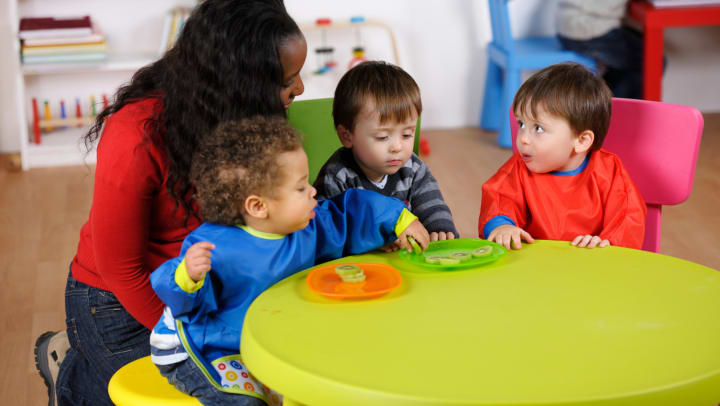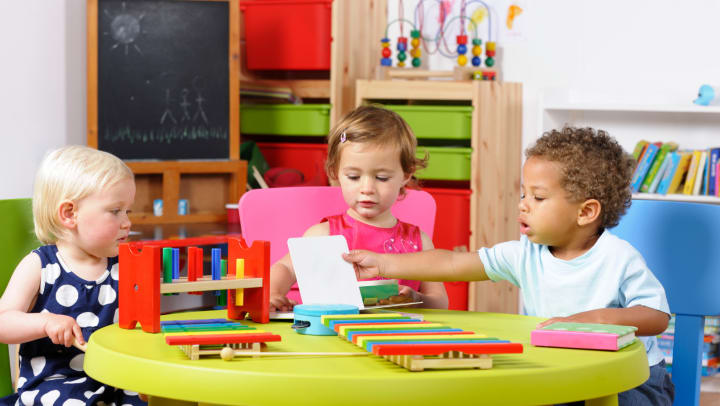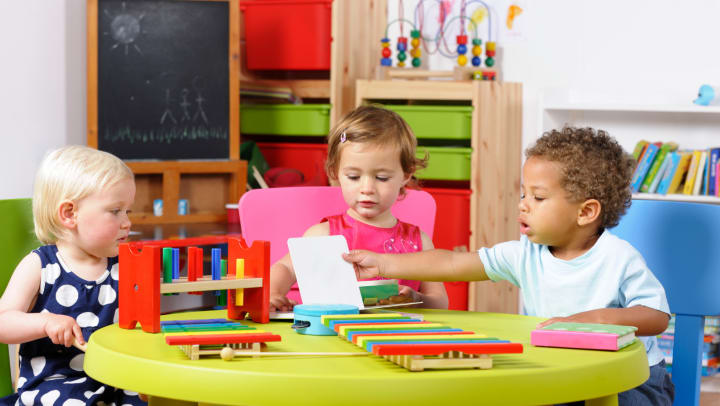
Toddlers are like wild animals.
As they emerge from the cocoon of infancy, completely self-centered, focussed only on getting their needs met, they immediately enter an age of awareness.
It's during this transition they become who they'll ultimately be.
When they establish the social skills to carry them through life.
This social intelligence is so important that it forms the foundation for the soft skills they'll need to navigate the world of relationships and jobs.
Soft skills enable people to communicate effectively, collaborate, and manage conflict successfully.
Soft skills are:
- Emotion-based
- Valuable for any job
- Not easily learned (because they're personality traits)
- Impactful (if there are two candidates with the same skill set, the one with better social skills will probably have an edge.)
Some soft skills employers look for, and qualities that make people easier to get along with are these:
- Effective communication
- The ability to function as part of a team
- Problem-solving capabilities
- Critical thinking skills
- Stress management
- Adaptability
- Conflict management
And believe it or not, these are the things we learn in our early years.
When the brain is super-sensitive in early childhood, these crucial social skills either blossom and grow or wither.
This is because, during these years, the brain is more plastic and malleable.
Every child goes through periods where specific brain areas become especially sensitive to input.
Connections are formed and strengthened with appropriate childhood experiences. After this period passes, the synapses become stabilized and less plastic.
This is also when the pre-school brain undergoes synaptic pruning.
This is as it sounds - the brain prunes unused neurons and neural connections to increase the efficiency of the ones being most used.
For a parent, this means the neural pathways you reinforce will become permanent, and the ones you neglect will die off.
This is why people find it difficult to change character traits later in life. It's not impossible to change your brain later on. It's just harder.
The social qualities we take for granted are learned, so I work hard to help the children develop them in my home.
These are the soft skills that can set them up for future success and happiness and how I teach them

Patience:
Infants are born with an instinctual sense of urgency.
For them, everything is pressing.
In the wild, a baby that screams will be found, fed, and protected.
The toddler also operates with this sense of urgency.
But, in our modern world, a toddler doesn't need to scream to be fed or found, so this heightened fight or flight response is something that needs to be culled.
They need to learn they're safe and that waiting won't kill them.
Making them wait teaches them waiting is safe.
That it's okay.
That waiting is necessary, and good things can come from waiting.
So they get used to the feeling and build a tolerance for it.
Most toddlers go through a phase where they'll scream and tantrum when you make them wait.
This is normal.
They don't like the feeling. It's upsetting and feels unsafe.
But you know they're safe, and if you just give them enough exposure to the feeling, they'll realize that they're safe too.
Let them have their moment, and let them get to the end of it before you give them what they want.
Hard as it is to watch, it's best to let them process the emotions and get to the end of a tantrum.
If you give in to a tantrum, it sends the wrong message and reinforces the wrong behavior. It shows it's the tantrum that gets the results, not the waiting.
So don't be sucked in by a raging tantrum. It's all theatre.
The frustration is normal.
Waiting is a foreign concept that makes them panic and pull out all the stops.
They just need to get used to it, and the only way to do this is to experience it until they can tolerate it.
They learn to cope.
When my daycare kids get upset about waiting, I just go about their business and let them feel their feelings. Then, when they've calmed down, I give them what they want.
This teaches them that they don't have to scream, that it's safe to wait, and that they'll get the reward for the most productive behavior.
In learning to cope, they also learn to control their impulses and regulate their emotions.
By doing this, I'm exposing them to an uncomfortable feeling until they learn to tolerate it.
I know it works because I've been doing it for years, but this isn't just my opinion. It's science!
When this type of technique is applied to help adults, it's called Exposure Therapy, and it's used to treat all kinds of problems, including:
- Phobias
- Panic
- Social Anxiety
- Trauma
- OCD
- PTSD
- Generalized Anxiety
These are the ways exposure has been found to help with fear:
- Acclimatization: In psychology, it's called Habituation which is just a fancy word for getting used to something.
- Neutralization: This is called Extinction which means it can erase fears that have already been learned.
- Resilience: In Psychology, it's called Self-Efficacy. It's another way to say that the more challenges you overcome, the more confidence you have to overcome challenges.
- Working negative emotions out of your system: This is called Emotional Processing. Basically, it means crying all the tears, feeling all the feels, and getting it out of your system, so you feel better. Repressing emotions and holding it all in is unhealthy. This is a type of Cognitive Behavioural Therapy.
For the toddlers, this means:
- Making them wait for things
- Letting them feel those uncomfortable feelings
- If they tantrum, let them process and work out those emotions
- Only after they calm down (on their own), give them what they want to trigger a reward response to the end result: them pulling themself together, calming down, and waiting
- Give praise (positive reinforcement) for them being able to tolerate and work through their feelings and achieve self-control
- Resist the urge to punish them for going through the process
Over time this approach will show them a few things:
- Waiting is a safe and natural part of life
- They will never get what they want if they scream
- They will get what they want if they're patient
Rushing everything so your child never has to wait because you don't like them getting upset robs them of the opportunity to develop this core characteristic.

Generosity:
Toddlers want everything.
They're programmed to compete for resources.
Their instinct is to hoard resources and steal from others.
If you've ever watched a room of toddlers who think they're alone, this is what you'll see.
Even the sweetest child will go through this phase. That's why toddlers hit, push and grab things from each other.
Some toddlers are more aggressive than others. They're not bad. They just have a strong instinct.
They can't help it.
They're programmed to survive in the wild.
But since we're don't live in the wild anymore, it's our job to help them work past this impulse.
So make them share, and teach them that giving something up can create positive results.
Let them experience that it's okay not to have everything.
This gets children comfortable with the concept of shared resources.
When you build comfort with sharing, you eliminate scarcity consciousness, opening the door for acts of generosity.
But this must be learned.
In my daycare, I purposely only have one or two of every toy.
I don't have enough of everything to go around - on purpose.
This forces the children to share resources.
If I had five of everything, I'd be creating an unrealistic expectation because, in life, we don't get to have everything we want when we want it.
Learning to behave generously can be painful at first.
But with repeated practice, the lesson becomes internalized, and charity becomes second nature.
It's important to encourage generosity, not just because it makes you nice but also because it actually changes your brain.
It increases activity in the caring and reward centers of the brain while decreasing activity in the amygdala - the part that signals our fight or flight response.
Increased activity in the amygdala is a marker for anxiety disorders - everything from generalized anxiety to PTSD - so decreasing activity in this area is good.
So even though your toddler instinctively wants everything for themselves during this phase, teaching them to share can actually be good for their mental health in the long run.

Resilience:
Resilience develops when we overcome hardship.
Toddlers build resilience by being able to try and fail and keep trying.
Resilience is an emotional strength we build through experience. It's the emotional muscle that carries us through hard times.
Left to their own devices, toddlers will happily build this muscle. They love a challenge and will try and try something until they get it - if we only let them.
Watch a group of toddlers, and this is what you'll see:
- Someone working for 20 minutes to get their shoes on
- Someone falling down many times and getting back up
- Someone trying to build something and working on it until it comes together, no matter how long
- Someone trying over and over to climb something
- Someone trying to find a group of friends and going person to person until they find their people
There's no emotional attachment to these actions for a toddler. It's just what they do. There might be some frustration or a little pain, but they'll just carry on if you don't make a big deal about it.
And before anyone gets upset, I'm not talking about not caring about your child. You can still love them just as much. I'm talking about not doing everything for them and not trying to fix everything for them.
Toddlers need their own emotional space.
They deserve the satisfaction of overcoming adversity as much as anyone else.
Many parents think they have to make everything easy and perfect for their child. They can't tolerate seeing their child struggle, even a little bit, but did you know that adversity can be a good thing?
There are advantages to adversity, especially for toddlers who are in the process of internalizing who they'll become as adults.
Some of these are:
- Development and strengthening of willpower
- Learning new skills
- Growing as a person (patience, perseverance, self-confidence)
- Overcoming limitations
- Building character (facing challenges with a good attitude)
- Learning to tolerate discomfort and work through it
Almost every success story contains perseverance in the face of adversity for a reason. It's because life isn't easy - for anyone.
So when I talk about detachment, it's the ability as a parent to let your child have the struggles that lead them to master the skills and learn the lessons.
Allow your child to see bad things can happen, challenges can arise, adversity can come their way, and they can persevere and overcome.
When I have a toddler in my care who struggles with a task, instead of taking over and doing it for them, I walk away. Even if they're frustrated, I try to give them enough time to work it out before I step in.
If I step in, it's not to do it for them. It's to show the child how to do it themselves.
The satisfaction of a job well done is a reward in itself. The more a child overcomes struggle, the less afraid of it they become.
This is how you teach resilience.

Compromise:
All toddlers want everything their way.
They all have a plan, and it involves them running the show.
They learn to compromise by not getting what they want every time.
But this can evoke feelings similar to waiting. It can feel like life or death to them.
Especially if they've been pandered to.
But teaching a child how to compromise is essential because life is full of compromise.
And you must make a point of facilitating this even for an only child.
Even though it's easy to give an only child everything and let them have their own way, it's better if you resist falling into this trap.
I know this first hand.
I have an only child, and I purposely devised a strategy for her socialization when she was little.
When she was a toddler, I'd have my friend's kids over for playdates two to three times a week, so my daughter could get the experience of being with peers.
She was the youngest of the grandchildren and an only child.
She was a bit too special, so I created a group of peers and made her function as an equal within it.
She wasn't allowed to hoard or withhold toys. She didn't get any type of special treatment.
I'd also take her to the YMCA daycare several times a week.
This ensured that she got the experience of being part of a group where she wasn't the center of attention.
She got no special treatment in these settings and had to share, wait, and give to the other children.
Because of this, she got used to sharing and compromising. As a result, she never developed a sense of entitlement.
My proudest moments as a parent over the years have been when teachers and others are surprised she's an only because she doesn't act like one.
Compromise is such an essential conflict resolution strategy that its absence can damage everything from relationships to governments, and it's on the decline.
I wonder if this is because of the school of thought in modern parenting, seems to be:
- Give your child everything
- Never say no
- Never discipline
- Treat them like they're the center of the Universe
Because even though it might make you feel better, if that's how you operate, you could be turning your child into a narcissist.
Here are some strategies to teach your toddler to compromise:
- Find some way to meet in the middle or split the difference
- Encourage both sides to engage (If you do this for me, I'll do that for you)
- Say, we'll do it my way this time and yours next time
- Do something manly how you want it but with a little of how they want
- Timeshare: alternate weeks or days for an activity or job. (For example, I let the older children turn off the TV when they're done TV time, each child gets to do it for a week at a time)
- Letting them convince you with logic or a better idea. (The daycare children set and clear the table for meals, I have a way I like them to do it, but if they can show me a better way, I will let them do it how they want)
Toddlers don't like compromise, so they'll naturally resist at first. But the more you allow them to practice this critical life skill, the easier it will get.

Social skills are the hidden glue that holds society together.
They strengthen our relationships and make us easier to get along with.
They also make us more successful, and that's not just my years of anecdotal observation and experience talking.
It's science.
They're so crucial that the American Journal of Public Health did a 20-year study of kindergarteners that rated their social skills on a 5 point scale. This scale ranged from "not at all" to "very well" on eight measures of "social competence."
They found for every one-point increase on the 5-point scale in a child's social competence score in kindergarten, he/she was:
- Twice as likely to attain a college degree in early adulthood
- 54% more likely to earn a high school diploma
- 46% more likely to have a full-time job at the age of 25
So teaching your child social skills is about more than just making them into friendly people.
It directly impacts their future success.
If we want our children to have the soft skills needed to thrive in the world, we must accept that it's our job as parents to teach them.
It requires work and integrity, but we sign up for it when we decide to have kids.
Because the ultimate goal we should have as parents is not to pander to the baby but to encourage and develop the emerging adult.
About the Creator
Erin King
Writer, musician, toddler wrangler, purveyer of common sense.






Comments
There are no comments for this story
Be the first to respond and start the conversation.